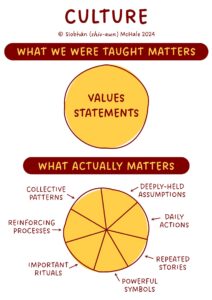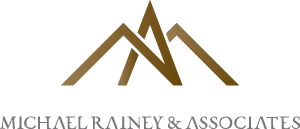Following last month’s discussion on Culture vs. Strategy, I was informed of a (in my opinion) thought-provoking post on LinkedIn regarding what matters in culture by author Siobhán (pronounced ‘shiv-awn’) McHale, whose books include The Hive Mind at Work and The Insider’s Guide to Culture Change.
What Really Matters in Organizational Culture
The post included the graphic below which compared the ‘value’ (what matters) of value statements in the context of culture versus what ‘actually matters’ in the form of practices of the organization (patterns, actions, processes, etc.).

Moving Beyond Decorative Value Statements
As we at MRA work with strategic leaders and the development of their cohesive decision strategy, we consistently remind them that their values statements (stated core values) must go beyond ‘a piece of paper on the wall’. Value statements that serve as decoration will never have a lasting impact on the minute-by-minute, hour-by-hour, day-by-day decisions within an organization that are a direct reflection of its culture. As a reminder, an organization’s culture is composed of three components:
An organization’s ‘culture’ is often expressed in general terms as an organization’s long-held beliefs about itself, the expectations of its members, and practices shared by the group (Meredith et al., 2017)).[1]
The Impact of Daily Decisions on Culture
Those daily decisions (practices) made by an organization that have a direct impact on operational performance are informed by expectations, either communicated or uncommunicated, that stem from long-held beliefs (either stated or unstated). As Siobhán McHale points out, the true assessment of an organization’s culture will be observed through practices, not value or belief statements alone.
Shaping Practices Through Beliefs
Those practices, whether we like what we see or not, are honed through expectations that are adopted by the organization as a direct result of what it believes about itself. If we do not like what we see, then we have the ability to affect change through establishing beliefs that will produce the practices that we would like to see!
Creating Intentional Practices
In our experience, practices that impact the organization at every level should stem from an intentional, clearly communicated, and shared understanding of what the organization values. Then, and only then, can intentionally designed expectations create those daily practices that directly reflect those values.
Reflecting Values in Daily Actions
Once that level of intentionality occurs, the daily actions, repeated stories, rituals, symbols, etc. of the organization will accurately reflect its desired value statements which resonate from their long-held beliefs about itself.
Empowering Organizational Members
Then every member of the organization will be able to view those practices through the lens of what we say ‘matters’ to the organization. To the point where if anything (collective patterns, reinforcing processes, etc.) does not match, then we can empower every member to identify the disconnect and reconcile the difference in real time so that the organization can move ahead and achieve their desired outcomes in a manner that represents them well. And that is what matters!
At Michael Rainey and Associates (MRA), we specialize in guiding our clients through the complexities of defining their organizational culture and developing a strategy that propels them toward achieving their goals. By ensuring that your values are more than just words on paper, we help align your team’s beliefs and practices to foster a thriving organizational environment.
If you’re interested in discovering how we can support your organization, we invite you to reach out for a complimentary consultation. Let’s discuss how we can help you achieve your desired outcomes and move forward with confidence.
[1] Defense Organizational Climate Survey (DEOCS) Redesign Phase 1 Overview Report





